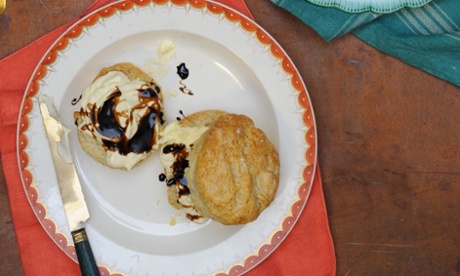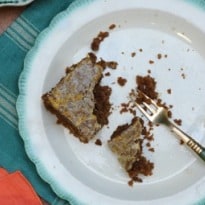Bitter treacle gives deep, rich flavour to these whisky-laden parkin and 'thunder-and-lightning' scone recipes - just the sort of comforting indulgence that will brighten up any fireside teatime.
Surely I can't be the only person - lured in by dreams of treacle tart and deceived by treacle's synonymy with all that is sickly and saccharine - to have made the mistake of taking a teaspoon to a tin of black treacle. Dark, bitter and not remotely sweet, it clung tar-like to my tongue in spite of my keenest efforts to wash down the trauma with cups of milk and fruit squash. To my credit, I was only nine or so. That said, I did make the mistake two more times over the years before the lesson was truly learned.
Treacle may be inedible by itself, but it's this very strength of flavour that makes it a pleasure to bake with: just a tablespoon can lend a welcome depth and warmth to a recipe, subverting the simple sweetness of a cake to create something with a little more character. Once you've started adding treacle to your baking, you'll find that there are very few instances where it doesn't make a bake about 10 times better.
Whisky-glazed parkin
Parkin is serious food. It's the sort of cake to be cut into fat squares and eaten with your fingers. It's a no-nonsense cake, sitting stolid at the opposite end of the baking spectrum to cute cupcakes and prissy petits fours. It could sustain you on a whole day's trek. I know, because I once spent the duration of a Highland hike at 10 paces behind the rest of the pack, hoping nobody would clock me smuggling mouthfuls of parkin from my bulging coat pockets.
There's no need to be too discerning about the oats you use here - any standard oatmeal will be absolutely fine. Use the fancy stuff like jumbo rolled oats and you'll actually end up with a heavier, slightly bitty cake. It's a blessed occasion where cheaper is better. I usually try not to be too prescriptive about serving, but in this case it really is important that you wait a day or two before eating if you can possibly bear it. Just make sure you wrap it tightly in foil or clingfilm to stop it drying out.
Serves 18
250g unsalted butter
250g soft light brown sugar
4 large eggs
150g treacle
200ml black tea
4 tbsp whisky
4cm ginger, peeled and finely grated
150g oatmeal
300g plain flour
2 tbsp ground ginger
2½ tsp baking powder
½ tsp bicarbonate of soda
¼ tsp salt
For the glaze
60ml whisky
Zest of 1 orange
150g icing sugar
1 Preheat the oven to 180C/350F/gas mark 4. Grease and line a deep tin or roasting dish of roughly 22x33cm.
2 Melt the butter over a low heat then leave to cool slightly before adding the sugar, eggs, treacle, tea, whisky and fresh ginger. Whisk thoroughly to combine. In a separate bowl, stir together the oatmeal, flour, ginger, baking powder, bicarbonate of soda and salt. Add the dry ingredients to the wet mixture and whisk until you're left with a smooth batter. It might be a little more liquid than you're used to, but this will give the parkin its characteristic moistness and soft crumb.
3 Pour the batter into the prepared tin and bake for 30-40 minutes, until well-risen and springy to the touch. A knife inserted into the middle of the cake should come out clean. While the cake cools in its tin, stir together the whisky, orange zest and icing sugar for the glaze. The icing will be reasonably thin. Pour it on top while the cake's still hot - this way, it'll soak into the top to leave just a barely there glaze. Leave to cool.
4 If you can bear the wait, it's best to wrap this cake in foil and let it sit for a day or two before tucking in. During this time its flavours will meld and deepen - leaving the cake treacly rich, spiced and delicious.
Treacle vanilla split scones
These delicately soft scones - sweetened with golden syrup and vanilla - are served split with clotted cream and treacle. Sometimes called "thunder and lightning" scones (thanks to the dark shock of treacle against flashes of bright cream), they're worth making for the name alone.

Makes 12
60g unsalted butter
350g plain flour
4 tsp baking powder
½ tsp bicarbonate of soda
¼ tsp salt
3 tbsp golden syrup
160ml whole milk
2 tsp vanilla extract
1 large egg, lightly whisked together with 1 tbsp milk
To serve
2 tbsp treacle
4 tbsp golden syrup
225g clotted cream
1 Preheat the oven to 200C/400F/gas mark 6. Grease 2 baking trays.
2 Cut the butter into cubes then use your fingertips to rub it the flour until no visible chunks of butter are left. Stir in the baking powder, bicarbonate of soda and salt.
3 Whisk together the golden syrup, milk and vanilla extract then stir this into the dry ingredients. Stir gently until the ingredients come together to form a soft dough. The mixture will be very sticky, but you should resist the urge to add more flour: it's this wetness that'll help to give perfectly soft, fluffy scones. Dry the dough too much and your scones will look and feel more like hockey pucks than teatime delicacies. Leave the dough to rest in its bowl for 15 minutes before shaping - it'll absorb a little more of the moisture and will become easier to handle.
4 Tip the rested dough out on to a well-floured surface and pat it down with your hands to form a layer about 2cm thick. It will still be a bit sticky, but just sprinkle a little more flour on if you need to. Cut circles out of this with a 6cm-diameter pastry cutter. Reroll any leftover dough, lightly knead and cut out more scones.
5 Arrange the discs on a baking tray lined with baking parchment. Take care not to handle the dough too much - overworking will leave the scones tough and dense. Brush the tops of the circles with the beaten egg mixture.
6 Bake for 15 minutes in the preheated oven, until well-risen and golden. Leave to cool completely on a wire rack.
7 Once the scones have cooled, beat the treacle and golden syrup together in a small bowl then add a little extra treacle (if you prefer a more robust bitterness) or golden syrup (for a sweeter finish) to taste. Serve the scones with a dollop of clotted cream and a drizzle of the treacle mixture.
Treacle treat: whisky-glazed parkin. Photograph: Jill Mead/Guardian










